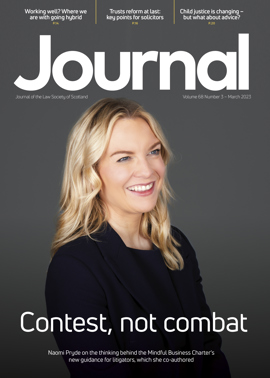In-house: Caring for the carers

This month we speak with Norma Shippin, former member of the In-house Lawyers’ Committee for six years, who worked for 38 years in the NHS Central Legal Office in Scotland, the last 10 of these as director and legal adviser to the NHS in Scotland, culminating in a well deserved retirement last year. She was and is well known in the legal community in Scotland, and reflects here on her experiences.
Tell us about your career path?
My career path ended with my retirement on 4 July 2022 – my own Independence Day! It started, following my LLB and Diploma in Legal Practice at Edinburgh University, with a traineeship at W & J Burness, then on to a job at the NHS Central Legal Office where I remained for the rest of my time as a lawyer.
What was your main driver for working in the public sector/the NHS? Would you encourage new lawyers to consider a career in public service, and why?
My mother was a midwife and while at university I worked during my summers as a nursing auxiliary at Raigmore Hospital Maternity Unit in Inverness. I studied medical jurisprudence under Sandy McCall Smith and Professor J K Mason as one of my honours subjects. This sparked my interest in that field of practice. I applied for a job in CLO when it was advertised, though I have to confess that I had never actually heard of its existence prior to that. It was a much smaller organisation in those days. When I started there were six other lawyers. When I retired I recall there were about 70!
I would really encourage new lawyers to consider a career in public service. I found the clients I worked with to be dedicated and caring – and that sense of being able to provide support and strength at times of trial for them was extremely rewarding.
How does the future look for in-house lawyers? What are the key challenges and opportunities?
My understanding is that in-house lawyers now make up a considerable proportion of those practising in Scotland, and that this is a much more respected career path than it might have been when I first started. It seems to me that the future is a bright one. The key challenge at the moment in the public sector relates to finance – there is a need to be cost effective and efficient without sacrificing quality.
In terms of challenges and opportunities, the possibilities to be part of a bigger picture and part of the team supporting a crucial service, and to get a real sense of that from your work, were endless. For me that was a great attraction – I loved being part of the NHS, not just part of the organisation that employed us but appreciating that CLO’s role was so much bigger than that.
Lawyers aren’t generally seen as particularly innovative. Would you agree? What have you done in any of your roles that has been innovative or resulted in process improvements for your team or organisation?
I think lawyers can be highly innovative! In the time I was in CLO we transformed our service into one which was client focused and team based. We developed a fee-charging system where the NHS clients would pay for what services they used, and we made sure that we regularly asked them what they thought of the service! We brought in peer review and performance appraisal at an early stage and started business and strategic planning before it was widespread in the profession.
The best ideas often come from unexpected places in organisations, and so we created a team from all parts of CLO to suggest improvements and innovations. Anyone could put forward an idea and it would be considered by the group, and often that was the way change took place. During Covid we adapted – like many others – to wholesale digital practice and communication to enable our service to continue virtually undiminished. I am so proud of the teamwork which prevailed at that time.
How have attitudes and working practices in the legal profession changed since you started out?
Very much! The legal profession has become a much more equality conscious one and more sympathetic to work-life balance. I remember as a trainee that working extremely long hours was totally expected – you would never go home before the last person had exited the department. Working part time or job sharing was very rare. Family friendly policies are now part of the culture. This is a good thing.
What advice would you give lawyers who want to start a career in-house? What makes a good in-house lawyer?
I would say go for it! Make sure you understand the culture and requirements of the organisation you are going into. A good in-house lawyer is one who is part of the team but who is also able to speak truth to power. A good in-house lawyer is one who understands the detailed rules and regulations which apply to that area of work but who can explain things in ways that the client can understand. A good in-house lawyer is an expert in the relevant area of law but understands their limitations and never advises beyond their competence – however much pressed to do so.
What did you love about your role, and what do you love doing now?
I loved the people I worked with in CLO. That will always be my highlight. They were a wonderful team – highly expert solicitors and support staff but also great fun and extremely committed to the NHS.
My working days are now done, but preparing for the day of retirement is really important for everyone and ensuring work is not all consuming is crucial. I play the cello, guitar and piano – not all at the same time. I lead our church music group and love that. I also have revived my interest in Gaelic and have joined a choir, which is excellent fun! There is definitely life after the law – but I still love catching up with former colleagues for lunch and coffee.
Finally, some quickfire fun if we may!
Rise and shine, or lie-in person?
Used to be lie-in, but now I like to get up and at it reasonably early so as not to waste the days.
Dinner party: host or attend?
Obviously both, but I find great joy in gathering friends round a table. Providing food is one of my currencies of love – a feature I inherited from my mother.
What is your most unusual/amusing work experience?
Turning up to give a lecture on informed consent with my son’s English homework on the floppy disk instead of my PowerPoint presentation. Death of a Salesman is an excellent play but not really relevant to the audience I had! Also turning up to give a lecture in my white cowboy boots having left my shoes on the train. Walking across the carpet to the podium seemed like an endless journey!
Best advice you’ve ever been given?
Apart from “Always check in a mirror that you don’t have lipstick on your teeth”, or Don’t take yourself too seriously”? I would say that the best advice is never lose your integrity. Sometimes it can be tempting to go for the jugular or for a quick win at someone else’s expense, but a lifetime of practice is a long time. Once you have lost your reputation it is very hard to recover. Be known as a person of your word! Oh, and last of all, be kind!
Questions put by Catherine Corr, In-house Lawyers’ Committee
What is the CLO?
CLO is part of NHS National Services Scotland, which provides a number of services to the NHS in Scotland. CLO is comprised of around 130 solicitors and support staff, and provides a comprehensive legal service to the NHS boards and some other public sector bodies. There are four departments – Litigation, Commercial Property, Commercial Contracts, and Employment. CLO solicitors regularly advise on mental health, practitioner services, ethical issues relating to patients, data protection, FOI and many other specialist areas.
Perspectives
Features
Briefings
- Civil court: No rule against redaction
- Corporate: Privileged or confidential – who can access
- Intellectual property: Big tech, AI and enforcement
- Succession: Non face-to-face will instructions; form C1
- Agriculture: “Route map” for agricultural reform
- Parking: About this ticket…
- In-house: Caring for the carers







